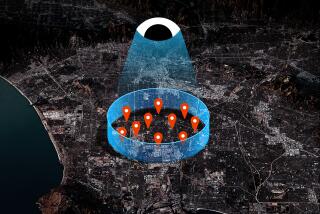Letters: Privacy in the modern world
- Share via
Re “A 21st century test: What’s a ‘search’?,” Editorial, Aug. 20
Six months after Congress passed a law requiring the Federal Aviation Administration to ease restrictions on commercial drone use in U.S. airspace and two weeks after The Times published an article noting that the Department of Homeland Security is trying to accelerate the use of unmanned aircraft, an editorial points out the 4th Amendment dangers of cellphones and GPS technology.
The editorial ends with the reassurance that “the language of the 4th Amendment to protect persons and ‘effects’ will, as it so often has, adapt to modern life.”
Orwell is becoming quite the prophet: “There was of course no way of knowing whether you were being watched at any given moment.”
Frank Thomas
Covina
The right to privacy has long been established — but as of yet there is no right to invisibility, especially for the likes of drug runner Melvin “Big Foot” Skinner. If he was astute enough to use a disposable cellphone in his drug trafficking, he should have been smart enough to know he could be located via that device.
As to law enforcement’s use of a court order rather than a search warrant to obtain the information needed to locate Skinner, both procedures required the cops to convince a magistrate they required the information to perform their duty — to protect the public from people like Skinner. They did, and the judge issued the order.
If criminals want to go about their nefarious pursuits carrying a device that broadcasts a signal that says “ Here I am,” it’s their problem if cops have a way of saying “Here we come.”
Steve Switzer
San Pedro
ALSO:
Letters: Innocent, but in prison
Letters: Teachers, unions and students
More to Read
A cure for the common opinion
Get thought-provoking perspectives with our weekly newsletter.
You may occasionally receive promotional content from the Los Angeles Times.










